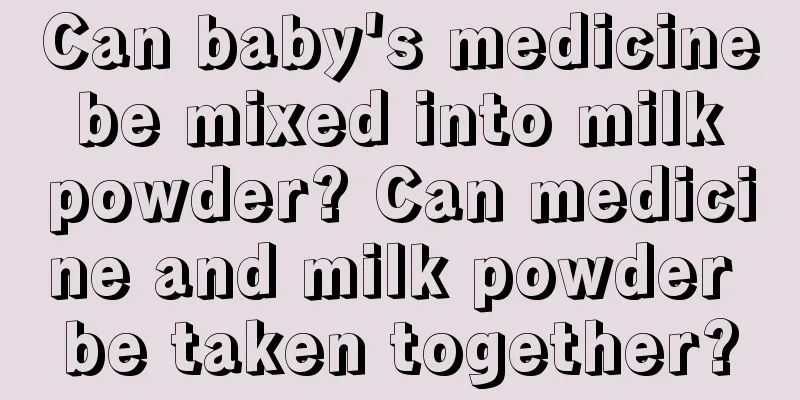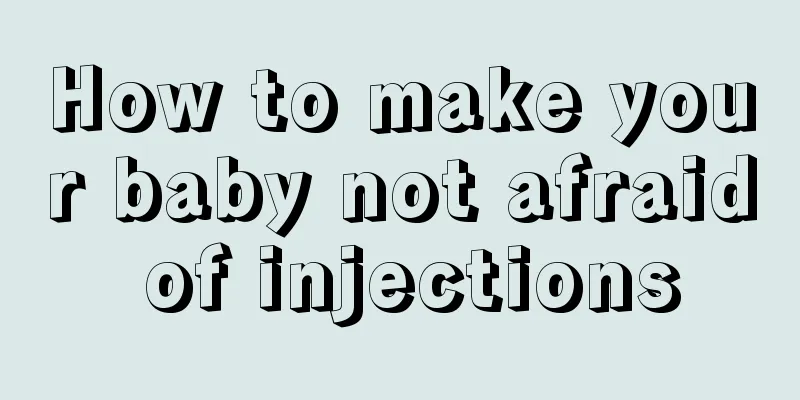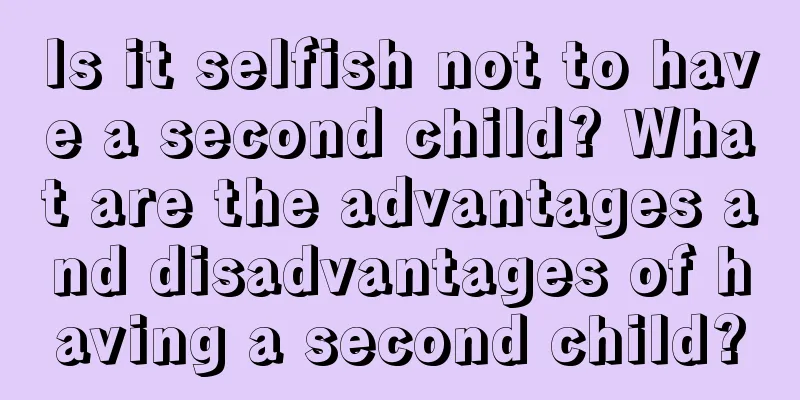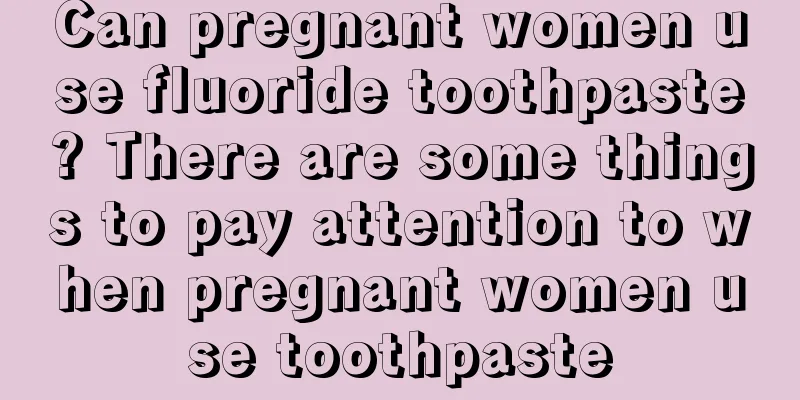Can baby's medicine be mixed into milk powder? Can medicine and milk powder be taken together?

|
As the saying goes, good medicine tastes bitter. Nowadays, many medicines are difficult to swallow, let alone for children. So, can medicines be mixed with milk powder? Let us introduce it below! Can I take medicine and milk powder together?This is not allowed. First of all, this may cause dilution of the drug concentration. Second, the drug is combined with the protein in the milk powder and is not easily absorbed. Therefore, it is best to take it with boiled water. First, you don’t have to eat it. Second, it may affect breastfeeding. Third, if vomiting occurs, it is difficult for you to determine whether to give the drug again. ? Can I mix it into milk powder?It is not recommended to do this. Children always catch a cold or get sick. Many children are afraid of taking medicine when they are sick, and mothers will be very distressed about feeding the medicine. So some mothers are smart enough to use milk powder to give the medicine to their children, but they don’t know that this will reduce the efficacy of the medicine and is not conducive to the child’s recovery. It is not recommended to take milk powder and medicine together. Reasons why it is not recommended to eat togetherGiving medicine with milk powder can also cause trace elements in the milk powder to react with elements in the medicine, generating new substances that are not conducive to human digestion and absorption, affecting the health of infants and young children. Some medicines can even be destroyed by the ions contained in milk, reducing the concentration of the medicine in the blood, which will also reduce the efficacy and affect the recovery of the disease. It is not recommended to feed medicine with a bottleIt is not recommended to use a bottle to feed medicine to babies, especially for infants over 3 months old, so as to avoid the baby having an unpleasant experience with the bottle and then resisting drinking milk. You can use a spoon to feed medicine. If the baby cannot swallow, a syringe or dropper is also a good choice. Precautions1. The best time to feed medicine is generally half an hour before or one hour after drinking milk. 2. When feeding medicine, do not press the spoon directly on the tip of the tongue, as this may cause the baby to vomit. You can feed it around the side of the tongue. 3. Do not force-feed medicine. When feeding medicine, do not feed the baby when he is crying or by pinching his nose, as this may cause the medicine and water to enter the trachea easily. 4. If the baby spits out the medicine after taking it, do not feed him again, because the baby may have swallowed some of the medicine. If you feed him again, it may increase the dosage. You can wait until before the next meal to feed him. 5. It is best to take the medicine with warm water and do not mix it with other substances. Precautions for baby medication1. Don’t trust friends or acquaintances to buy medicinesNowadays, many parents like to exchange parenting tips in private, and they trust the products and medicines recommended by their friends. Ji Lianmei reminds parents not to blindly trust the recommendations of friends or acquaintances and give their babies certain medicines in private. Because each baby's condition is different and the cause of illness is different, the doctor should determine which medicines are needed after judging the patient's condition. 2. Do not give your baby adult medicineSome parents will give children drugs that they have taken and found to be effective, and halve the adult dose. They think that as long as the dose is halved, there will be no problem. Ji Lianmei reminded that children are not smaller versions of adults, and it is unscientific to give children drugs at half the adult dose. Children's livers are not yet fully developed, and their ability to detoxify drugs is not as good as that of adults. At the same time, children's kidneys are still in the process of growth and development, and their ability to clear drugs is not as good as that of adults. In addition, the blood-brain barrier function of children's brains is not fully developed, and it cannot prevent certain drugs from damaging the brain. Therefore, babies should not be given adult drugs at will, and it is not okay to reduce the dose in time. 3. Take a rational view of the use of antibioticsMany doctors now remind parents not to abuse antibiotics, so some parents simply refuse to use them. Ji Lianmei reminds parents that they should be rational about the use of antibiotics. Antibiotics are prescription drugs, and parents are not allowed to use them on their own. However, if the doctor clearly diagnoses a bacterial infection and prescribes antibiotics, parents should follow the doctor's instructions and take the antibiotics in sufficient doses for the full course of treatment, and should not blindly refuse them out of rejection. (:) |
<<: Here are the answers to your questions about baby food supplements
>>: What should I do if my baby has indigestion? What should I do if my baby has dry stools?
Recommend
Is it normal to have more vaginal discharge before giving birth?
Before giving birth, the mother's vaginal dis...
How old can babies play on the swing and slide?
Swinging and playing on a slide are very interest...
How to prevent baby from getting cavities? Don’t let your child eat adults’ saliva
It is very common for children to have cavities, ...
How do parents teach their babies safety knowledge in kindergarten?
When a child starts going to school, it is the be...
What is going on when a newborn's hair stands up? What should I do if a newborn's hair stands up?
After the baby is born, the mother needs to take ...
Symptoms of overnutrition in pregnant women Effects of overnutrition in pregnant women on the fetus
The physical condition of a pregnant woman is ver...
What is the best food to eat when you are pregnant with your second child? What should you eat to regulate your body when you are pregnant with your second child?
After the second-child policy was opened, many co...
What is the effect of getting angry during breastfeeding on the baby? Will getting angry during breastfeeding affect the baby's getting angry?
Does getting angry during breastfeeding affect th...
Symptoms of ADHD in children. What should I do if my child is hyperactive?
It is a sign of health for a child to be lively a...
What kind of breakfast is nutritious for students? Which breakfast is easy to harm children's health?
Nowadays, many parents like to give money to thei...
How many days after giving birth can I eat fruit? How long after giving birth can I eat fruit?
After giving birth, pregnant women are weak and n...
Will using musk perfume cause infertility in women? What is musk?
In the popular palace drama "Empresses in th...
Postpartum relaxin causes joint pain. What to do if you have joint pain all over your body after childbirth?
Pregnancy and childbirth are things that most gir...
Can babies use electric blankets? Is it good for babies to use electric blankets?
The weather is getting colder, and many people ha...
How to change the head of Oral-B electric toothbrush? How often should the head of Oral-B electric toothbrush be changed?
Generally, the toothbrush head needs to be replac...









